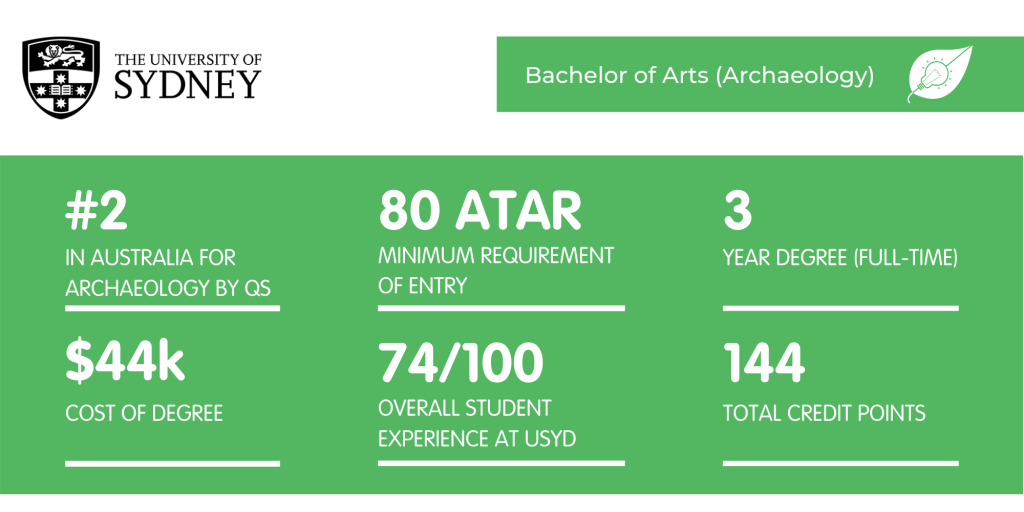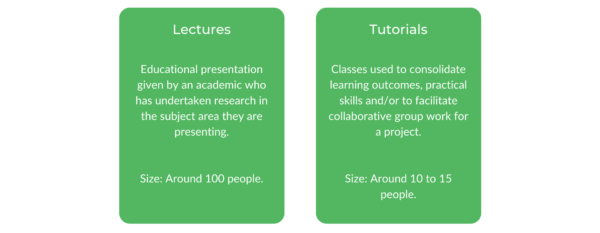Have you been considering a major in Archaeology at USYD?
Well, you can do it with a Bachelor of Arts degree, and we’re about to break down what you can expect if you choose to study this course.
So, keep reading if you want to find out more about studying Archaeology at USYD, including the type of subjects you’ll take, the course culture, and even more!
What is a Bachelor of Arts majoring in Archaeology at USYD?
Core Units for this Degree
How to Get into Archaeology at USYD
What’s the Teaching Format?
What’s the Faculty and Culture Like?
What is a Bachelor of Arts majoring in Archaeology at USYD?
A Bachelor of Arts, majoring in Archaeology at USYD focuses on studying human history. It involves analysing historical evidence, including written sources and artefacts, and helps you develop an understanding of our history on this Earth.
“If you’re into the practical side of history then there’s definitely a focus on that in Archaeology… in the later years you can choose to do more practical subjects rather than just the theoretical side.” — Natalie Taylor Bachelor of Arts (Archaeology)/Bachelor of Advanced Studies (Media and Communications) I at USYD
Can this degree be studied in conjunction with another?
A major in Archaeology at USYD is part of a Bachelor of Arts. However, an Archaeology major can also be taken within a double degree in a Bachelor of Arts and a Bachelor of Advanced Studies and many other double degrees which are attached to a Bachelor of Arts.
To see what other courses offer an Archaeology major, click here!
Honours
If you’re looking into a career in archaeological investigations, NSW state authorities such as the NSW Code of Practice for Archaeological Investigation and Heritage Council of New South Wales have indicated a preference for graduates of a Bachelors Degree with Honours in Archaeology.
So if this is a path you’d like to follow, you can complete an Honours year which involves writing a 20,000 word thesis! You will need a WAM of 70 or above in order to qualify for admission.
Career Paths
As for career paths, a major in Archaeology at USYD can land you in jobs other than archaeology, including:
-
- historical museum or gallery curator
- conservator
- archivist
- cartographer,
- secondary teaching
- tertiary teaching
- and many other specialist roles (i.e. marine archaeology)
“You might think you just go on digs all the time, but it’s really more than that. It’s a lot of research and analysis, and sometimes it can involve sciences like chemistry or biology.” — Natalie Taylor
Core Units for this Degree
In your first year of studying Archaeology at USYD, you will have to complete ARCO1000 and ARCO1001, in Semester 1 and 2 respectively. These are core units that you must take.
The great thing is, that by the second and third year of this degree you’ll get to pick more specific units from a range of topics to suit your personal interests!
Ancient People: Hunters and Farmers (ARCO1000) is focused on understanding the beginning of civilisations, the evolution of humans, and the beginnings of agriculture.
Civilisations of the Ancient World (ARCO1001) gives you a broader overview of the different areas in ancient history. This includes Greece, Italy, Mesopotamia, Rome, Egypt and more!
Regional Streams
The cool thing about this major is that you can choose which type of Archaeology you’d like to study, as USYD offers three different streams:
-
- Australian Archaeology
- Western Asia Archaeology
- Classical Archaeology
So in a way, you get to choose a specialisation within your major!
Field Work
For Archaeology at USYD there are a range of field work opportunities that can provide you with the real-life experience of excavation and research practices. Getting involved with different archeological organisations is not only a great extracurricular activity, but it will also allow for more hands-on application of what you learn in classes.
“There are opportunities to travel abroad and do field work for the uni. They have an institute in Athens where you can do field work and study there at the Australian Archaeological Institute of Athens which connects with Sydney Uni.” — Natalie Taylor
How to Get into Archaeology at USYD
A Bachelor of Arts at USYD requires an ATAR of 80 to get in — with this ATAR you’ll be able to take on a major in Archaeology. However, if you choose to complete a major in archaeology at USYD in a double degree, perhaps with a Bachelor of Advanced Studies, this entry mark would vary.
Alternate Pathways
If you don’t receive the required ATAR for entry into this degree, there’s no need to worry! Like with many degrees at USYD you can apply for different entryway schemes such as E12, Gadigal Program, Broadway and Future Leader.
Are there any prerequisites?
For a major in Archaeology there are no prerequisites, but it’s common for Archaeology students to have done some sort of history at high school — and if you want to pursue studies in archaeology, you most likely already have a passion for history.
What scholarships are available?
As for scholarships, there are a range of research grants available to students completing a postgraduate degree in archaeology at USYD. There are also scholarships available for international travel and studying abroad with the Australian Archaeological Institute of Athens (AAIA).
You can find out more about the AAIA scholarships here!
What’s the Teaching Format?
At USYD, the academic year consists of two semesters. For Archaeology, you have one core subject per semester in the first year, where lectures run for 2 hours and tutorials run for 1 hour. So, you essentially have 3 contact hours per subject.
Class Structure
Lectures
In these 2 hour classes, you are usually presented with information by a lecturer at the university that has a wide understanding of the topic area and experience in archaeological research and investigation. Approximately 100 students attend the lectures.
Tutorials
Following up on lectures, you’ll find that tutorials give you the opportunity to apply the concepts you’ve learnt. These classes are more activity based and involve handling artefacts, historical objects and 3D models. Normally, tutes consist of 10 to 15 students.
Seminars
These aren’t compulsory to attend but if you’d like to learn more about Archaeology, these seminars are an optional additional resource, called the Near Eastern Seminar Series.
“There are also regular seminars you can listen to which deal with different types of archaeology over the world. It’s not actually part of the course, but it’s run by the university and you can listen to different talks about archaeology in different areas.” — Natalie Taylor
What are assessments like?
When it comes to assessments for Archaeology at USYD, you can expect to do smaller quizzes based on course readings, mid-semester and semester exams based on lecture content, and larger essays.
“We had 5 quizzes [in Semester 2] based on a specific type of material, such as glass or wood. This was more practical and we had to analyse certain objects to identify how it was made and what area it came from.” — Natalie Taylor
What skills do you learn majoring in Archaeology at USYD?
Archaeology at USYD focuses on Australia, the Near East and the Mediterranean, where you learn about ancient civilisations and cultural practices. You develop the skills to investigate into and reconstruct ancient history from archaeological sources.
What’s the Faculty and Culture Like?
The Archaeology Faculty at USYD is really focused on its specialisation in Australia, the Near East and the Mediterranean, so the staff, including lecturers and tutors, are really engaged with the topics at hand.
While students of this major can get a little competitive because it’s such a niche interest, people who are doing it really love it.
I feel like you have to be a history nerd to love it… it makes everyone really passionate about it, so the community is really nice.” — Natalie Taylor
Alongside the students in Archaeology, and the friendliness of each cohort, tutors and lecturers are also helpful! You’ll find that you are well supported within the Archaeology community, as the tutors are quick to answer questions and respond to emails — they’re just so passionate and willing to lend a hand.
The Near Eastern Seminar Series is an additional resource provided to students studying Archaeology at USYD. It involves a number of different lectures presented by academics at the uni, providing you with insight and a more in depth understanding of different aspects of Near Eastern archaeology!
Clubs and Societies
“There’s an archaeology community that runs events and keeps students updated with graduate possibilities as archaeology is hard to get into in terms of jobs. However there are also opportunities opening up in first nation Australian archaeology.” — Natalie Taylor
ArchSoc, short for Archaeology Society, is a great opportunity for you to network with other students studying Archaeology at USYD, and also become more proactive in the Archaeology community. You can also get involved with additional classes and symposiums all about different topics in archaeology!
Interested in the pros and cons of this degree? Check out our article here!
Nandini Dhir is a Content Writer at Art of Smart and is currently studying a Bachelor of Arts (majoring in Marketing) and a Bachelor of Advanced Studies (Media and Communications), as a Dalyell Scholar, at Sydney University. She enjoys covering local issues in her area and writing about current events in the media. Nandini has had one of her pieces published in an article with the Sydney Morning Herald. In her free time, Nandini loves doing calligraphy, ballet, and sewing, or is otherwise found coddling her cats.






